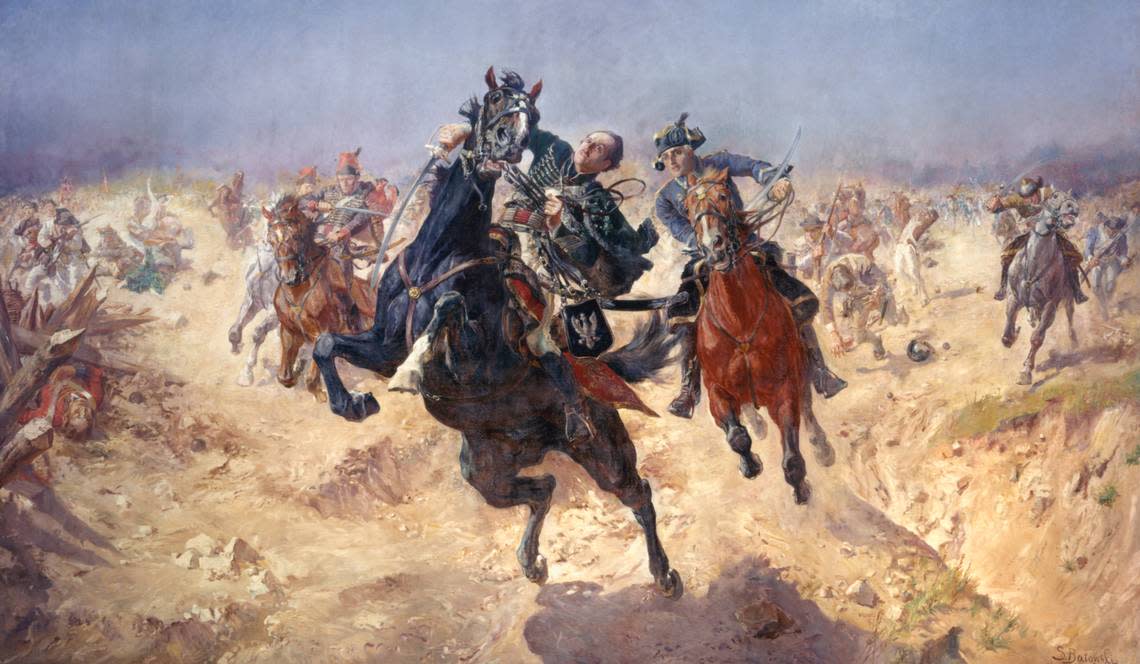From the BND Archives: What is Casimir Pulaski Day and why do we celebrate it in Illinois?

This article by Mike Koziatek was first published in 2023. We are reposting the story today, Casimir Pulaski Day in Illinois.
As the world watches Ukrainians battle the Russian army, the current war evokes memories of Casimir Pulaski’s struggle against Russians in Poland about 250 years ago.
That’s the view of the leader of the Polish Museum of America in Chicago, where an annual Casimir Pulaski Day ceremony will take place on Monday to honor Pulaski, who died in 1779 while fighting for America in the Revolutionary War and is considered by historians as the “Father of the American Cavalry.”
Before Pulaski joined the American fight for independence, he fought in Poland in an “uprising” against Russians, said Richard Owsiany, who has served as president of the Polish Museum of America for eight years.
“History constantly repeats itself in Eastern Europe,” Owsiany said.
“Throughout our 1,000-year history, we’ve had many, many skirmishes, battles and fights with Russia and Ukraine has gone through the same thing,” Owsiany said of Poland.
With Casimir Pulaski Day on Monday, March 3, in Illinois, here’s a question and answer about the holiday as part of the The BND’s effort to answer questions from BND readers:
What is Casimir Pulaski Day in Illinois?
It’s a day when some schools and government offices are closed in honor of Pulaski.
It’s scheduled for the first Monday of each March because Pulaski was born on March 6, 1745, in Poland.
Gov. Jim Thompson signed a bill that established the Pulaski holiday in March 1986. The bill called for schools to close. State offices were not closed but municipalities could choose to close. This bill was preceded by a statewide proclamation in the 1970s that said the first Monday in March would be a commemorative day in honor of Pulaski.
How have the Pulaski holiday closings changed over the years?
After Thompson signed the Pulaski Day bill, schools across the state were closed for the holiday beginning in 1986.
But in 1995, state lawmakers gave school districts the opportunity to waive the holiday. In 2012, Chicago Public Schools stopped scheduling the holiday.
This year, 295 districts, or 35%, of the state’s 852 districts scheduled the holiday for students, according to the Illinois State Board of Education.
Check with your local district to see if your child has to go to school on Monday.
Metro-east government offices are open on Monday but the city of Chicago offices and Cook County courts are closed.
Why do we celebrate Casimir Pulaski day in Illinois?
The late state Sen. LeRoy Lemke, D-Chicago, sponsored the bill that established the first official Pulaski holiday in 1986.
The Associated Press reported in 1986 that Lemke had lobbied for the bill for 13 years after he saw “derogatory” treatment of Polish candidates in the 1972 election.
“This holiday shows the contribution Polish-Slavic Americans have made to this country,” he told The AP. “It is a symbol of those who fought and died for liberty.”
WBEZ, Chicago’s NPR radio station, has reported on the passage of the Pulaski holiday bill and noted the city’s large Polish population was a key factor in lawmakers deciding to honor Pulaski.
“For Poles and Polish Americans, it’s a recognition for our contributions to the fight for American freedom during the Revolutionary War,” said Owsiany of the Polish Museum of America.
“Pulaski gave the ultimate sacrifice. He’s a hero who gave his life for this country.”
How can I celebrate the holiday?
The Polish Museum of America in Chicago will host a virtual ceremony from 10 a.m. to noon Monday in honor of Pulaski.
The event will be livestreamed on the museum’s website at www.PolishMuseumOfAmerica.org.
What did Casimir Pulaski accomplish?
Here are some highlights of Pulaski’s life and his legacy:
▪ After battling the Russians in Poland, Pulaski made his way to Paris, where he met Benjamin Franklin in 1776. Franklin gave him a letter of recommendation to Gen. George Washington and Pulaski sailed to America. Franklin wrote that Pulaski was “renowned throughout Europe for the courage and bravery he displayed in defense of his country’s freedom.”
▪ Pulaski wrote to Washington that he was committed to the American cause: “I came here, where freedom is being defended, to serve it, and to live or die for it.”
▪ Pulaski is credited with helping save Washington’s life during the Battle of Brandywine on Sept. 11, 1777, in Pennsylvania. “His courageous charge in this engagement averted a disastrous defeat,” according to a 2009 resolution that named Pulaski an honorary U.S. citizen posthumously.
▪ With Washington’s support, Pulaski was given the rank of brigadier general and made the first commander of the American cavalry.
▪ Pulaski formed the Pulaski Cavalry Legion, which fought the British in February 1779 in Charleston, South Carolina.
▪ Pulaski was wounded on Oct. 9, 1779, during the battle against the British in Savannah, Georgia and died a short time later. He was 34. There are conflicting reports about which day he died and where his body was buried.
▪ In 2009, President Barack Obama signed the joint resolution of the Senate and the House that made Pulaski an honorary U.S. citizen posthumously.


